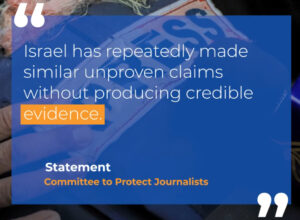In an intensification of actions against the press, the Israeli military has accused six Palestinian journalists in Gaza of collaborating with militant groups, as part of an increasingly aggressive campaign to suppress independent reporting in the region, sparking widespread concern over the safety of journalists and the future of press freedom.
Journalists in Gaza Accused of Collaborating with Hamas
The Israel Defense Forces (IDF) took to social media to accuse six Palestinian journalists in northern Gaza, all affiliated with Al Jazeera, of being operatives of Hamas and Islamic Jihad, two groups at the center of the ongoing conflict. Among those accused are prominent journalists Anas Al Sharif and Hosam Shabbat, whose reporting has garnered millions of views across multiple platforms. These journalists are now at greater risk, as the IDF’s accusations effectively label them as military targets.
The IDF claims it has documents proving these links, but independent verification of these claims is lacking. Al Jazeera has vehemently denied the accusations, asserting that its journalists are being targeted for their work in documenting the ongoing humanitarian crisis in Gaza, including alleged war crimes and human rights violations. Since the outbreak of hostilities on October 7, 2023, following a Hamas attack on Israel, Al Jazeera remains one of the few international media outlets providing coverage from inside Gaza.
These accusations come against a backdrop of increasingly dire conditions for journalists in Gaza. In addition to the dangers posed by Israeli airstrikes, journalists must navigate the challenges of famine, widespread destruction, and the displacement of 90% of Gaza’s population. The destruction of 80% of the enclave’s buildings has made reporting exceedingly difficult, yet journalists like Al Sharif and Shabbat remain committed to documenting the reality on the ground.
The Growing Death Toll Among Journalists
The war in Gaza has taken an unprecedented toll on media workers. As of October 23, 2024, the Committee to Protect Journalists (CPJ) has confirmed that at least 128 journalists and media workers have been killed since the conflict began. Of those, 123 were Palestinians, two were Israelis, and three were Lebanese. This makes the Israel-Gaza conflict the deadliest period for journalists since the CPJ began collecting data in 1992.
The dangers facing journalists are not limited to those in Gaza. Media workers in the West Bank, Israel, and Lebanon have also been caught in the crossfire. Many journalists have been injured, some critically, while others have been arrested or gone missing. CPJ is currently investigating over 130 additional cases of journalists being killed, injured, or detained, though documenting these cases has proven difficult amid the chaos and destruction.
Among the casualties are well-known names like Issam Abdallah, Hamza Al Dahdouh, Mustafa Thuraya, and Ismail Al Ghoul, all of whom were killed in incidents that CPJ has classified as deliberate murders by Israeli forces. Despite wearing “Press” vests and being clearly identifiable as journalists, these media workers were targeted while covering the conflict.
The Israeli military has repeatedly stated that it does not intentionally target journalists, though it admits that it cannot guarantee their safety in active war zones. However, the international community and press freedom advocates argue that Israel’s actions show a disturbing pattern of impunity when it comes to violence against journalists.

Closure of Al Jazeera Bureau in Ramallah
In a related development, heavily armed Israeli soldiers raided Al Jazeera’s bureau in Ramallah, located in the occupied West Bank, in the early hours of September 22, 2024. Soldiers arrived at 3 a.m., ordered the overnight team to leave the premises, and sealed the entrance with metal plates. The head of the bureau, Walid al-Omari, was handed a military order mandating the closure of the office for at least 45 days.
The bureau’s closure follows an earlier move by the Israeli government in May 2024 to shut down Al Jazeera’s office in Israel, citing a newly enacted law that allows the government to close foreign media outlets deemed a “threat” to the state. The closure of the Ramallah bureau is particularly significant, as it is located in Area A of the West Bank, which is under Palestinian Authority control according to the Oslo Accords. Despite this, Israeli forces frequently operate in these areas with impunity, further complicating the work of journalists.
There are concerns that the closure may extend beyond the 45-day period, similar to the indefinite closure of Al Jazeera’s Israel bureau. During the raid, Israeli forces were accompanied by engineers, raising fears that they may have tampered with or destroyed the bureau’s archives. Al Jazeera’s team was left standing on the street for hours, unable to retrieve their belongings or cover the raid due to threats from the soldiers.
A Broader Crackdown on Press Freedom
The closure of the Al Jazeera bureau, coupled with the targeting of Palestinian journalists in Gaza, underscores Israel’s broader efforts to limit media coverage of its military operations in Palestinian territories. Over the years, Israel has accused Al Jazeera of incitement and promoting terrorism, particularly through its coverage of the Gaza conflict. These accusations, however, are often seen as attempts to silence critical reporting.
Rami Khouri, a fellow at the American University in Beirut, noted that Israel’s actions are part of a long-standing policy to control the narrative surrounding its occupation of Palestinian territories. “This is very much in line with the policy of the state of Israel since 1948,” Khouri said, “to prevent real news about Palestinians or about what the state of Israel is doing to Palestinians.”
International Condemnation and Calls for Action
The CPJ and other international watchdogs have condemned Israel’s targeting of journalists and its restrictions on media access. In a recent statement, CPJ Program Director Carlos Martinez de la Serna emphasized the critical role of journalists in conflict zones, stating, “Every time a journalist is killed, injured, arrested, or forced into exile, we lose fragments of the truth.”
Journalists are civilians and are protected under international law, and deliberately targeting them is classified as a war crime. In May 2024, the International Criminal Court (ICC) announced that it was seeking arrest warrants for both Hamas and Israeli leaders for war crimes and crimes against humanity, including the targeting of civilians, such as journalists. However, accountability remains elusive, as Israel has faced minimal consequences for its actions against the press.
What Lies Ahead for Palestinian Journalists?
Journalists like Hosam Shabbat, who has been accused of collaborating with Hamas, continue to work under the constant threat of death. Shabbat has publicly condemned Israel’s accusations as fabrications designed to justify the assassination of journalists. Despite these threats, Shabbat and others like him remain committed to reporting on the humanitarian crisis in Gaza.
The closure of Al Jazeera’s bureau in Ramallah complicates efforts to provide independent coverage of the Israeli-Palestinian conflict, with media workers already facing restrictions on movement, equipment shortages, and constant surveillance. With foreign journalists largely barred from entering Gaza and Palestinian journalists under threat, the ability to document the full scope of the conflict is severely compromised.
The Future of Press Freedom in the Region
As the war in Gaza continues, the role of independent journalists becomes ever more crucial. Their work sheds light on human rights violations and provides a voice to those living under the shadow of war. However, with Israel tightening its grip on the media, these journalists face unprecedented challenges, including threats to their lives, forced closures of their offices, and unfounded accusations of terrorism.
The growing threats to press freedom in Gaza and the West Bank raise serious questions about the future of independent journalism in the region. Without a free press to hold those in power accountable, the world risks losing the recording of critical insights into Israeli war crimes.




